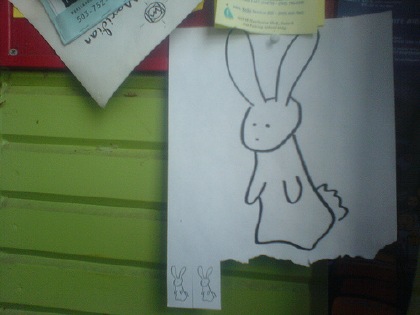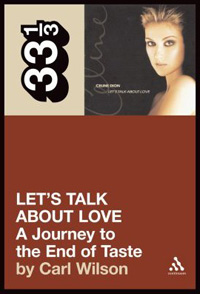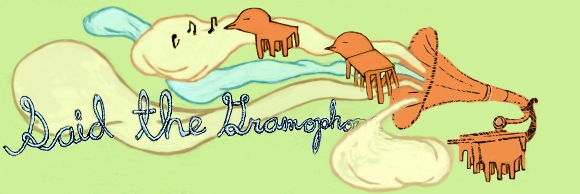
Today's post is about ghosts. Here are four swift introductions, and then a story. See also this.
Queen Victoria - "Up On The Rooftop".
Queen Victoria is also called Nick Malkin and The Endless Night comes in a black package without any information, just a sepia photograph that makes me think of Jandek, but the music is warmer than that (for all its desolation), and Malkin's moan does not sound as sad as it makes itself out to be, like someone who's waiting for the day when he can garage-sale all his Leonard Cohen records while his wife plays inside with their little girl. [MySpace]
Phosphorescent - "Cocaine Lights".
A eulogy, a hymn, a folk-song. In the raga of piano, guitar and tambourine you hear voices open, just singing, no words, and you hear these groans wobble & sour, all the death shaking out from their loose, live lungs. [buy]
The Harpeth Trace - "Who Knows Where You Are".
I do not know if there is mist in Los Angeles, but if there is not I suspect the Harpeth Trace spend their evenings on the beach, watching the stars begin to pinprick, wishing that maybe the Clientele's London fog will make its way through the seven seas to wrap them up where they stand. [buy/West Coast tour]
Burial - "Raver".
If you fall down at the nightclub, 3:00 in the morning, streetlights and taillights and twilights smeared in your eyes, and you hit your head, and your dreams exte-e-end, Burial would be playing behind your sleep. [buy]
---
On Valentine's Day, when Lila was twenty six, she stopped hearing ghosts. It didn't happen until their dessert was coming out, something with coconut and silken tofu, but all of a sudden the restaurant around her went very quiet and she could hear the Thai music a little better and hear Jake a little better and hear the couples beside them a little better. And she didn't think anything of it, really, because the dessert was fucking good and she was trying to decide if she'd go back with Jake after dinner and it wasn't until much later, when she was walking home alone along the ice, that she realised wait wait wait wait wait wait where did they go?
When she was a little girl, Lila thought that everyone heard ghosts. Their whispers were part of regular life, like pins-and-needled feet, or the wind, and she did not pay much attention to their murmurs. But the third time she mentioned them to her parents, they began to ask her questions. And her answers led to concerns, and the concerns to late-night conversations, and to psychiatrists, and doctors, and ultimately to a wary wonderment in their eyes, not quite sure what to say to the daughter who heard spirits.
The ghosts didn't speak in words; they moaned and murmured. Their sounds made Lila think of rivers, rushes, bass saxophones, her dog's happy panting. It was a very soft cacophony, sometimes quiet and sometimes loud, but always there. At her grandmother's wake the voices were so low they almost disappeared; at the bus-stop outside St-Laurent metro, they were inexplicably deafening. When Lila kissed Gregory Pavlovich in sixth grade, the ghosts shook bells, such gentle bells, more daffodil than carillon. At dance-clubs they groaned under the soundsystem's beats, like the swerve of blood through her veins.
But now, on February 14th, they had vanished. The night whistled down Parc Avenue and there was nothing hidden under the wind. Lila slipped into a phone-booth and closed her eyes. She could hear cars skating by, a siren's distant cry, and silence. Back at her apartment every room was barren. The curtains hung unmoving at the window and she lay in her empty bed waiting, just waiting.
The next morning, the ghosts had still not returned. Nor did they return on the 16th, 21st or 28th of February. Lila trudged to work with head bowed, concentrating, straining for whispers. She sat for two hours outside St-Laurent metro, stamping her boots to keep warm. She slipped into the throng at Zoobizarre, one night, and pressed her ear to the speaker as if she might jar something free. And later she stood shivering atop Mont Royal, ankle-deep in snow, imagining a voice that would rise up & out of the skyline. No voice came.
Again she went to doctors, twenty years after those initial appointments, but this time with a different question: where did the voices go? She spoke with friends, former lovers, telephoned her parents in Florida. On a Sunday morning she found herself at church, bored out of her mind, and light streamed in through the stained glass.
"I used to hear all these voices," she said to Jake. "I don't know what they were. Who they were. But they were there, they were there. You know? Everywhere. And now it's all gone. Like someone turned off the sound of your heartbeat, or if you lived by the ocean and someone turned off the tide."
"Maybe the dead died," he said.
"Maybe they weren't the dead," she said.
Grocery shopping felt hollowed out, like all the smells were gone. Drinking felt hollowed out, like there was no one to catch her if she got too drunk. Sleeping felt hollowed out, all the dreams like paper. She seduced Jake, brought him cherries and honeycomb toffee and kisses, and she brought him back to her place, and she wrapped him in her legs, and in the midst of her flush she clenched her fists because she knew, she knew, she could hear and she knew - nothing had changed.
And what can I say, really, except that the ghosts never came back. That Lila spent the rest of her days listening for the departed voices, hunting for wisps of them in other things, carrying in her heart a nostalgia that was lonely and unsure, wondering as she aged if she had imagined it all, whether she had ever heard these things, and who believes in ghosts anyhow, and probably it was some ear problem, and who cares, and the murmurs of spirits have nothing to do with our greatest joys, and what's the point of searching for things that don't dwell here with us, and why not just love & live here, with bodies and birds, and forget the forgotten things, just live under sky and over earth, in winter and summer, and be happy and sad and mortal, yes and mortal, (and when we die we will be home again).
---
If you live in Montreal, I still say you should come to this concert tonight because the bands are amazing and the price is right and many of my friends will be there so probably yours will be too. Spake the Grandmaphone: oh yes oh yes, uh huh, yup, yes, damn straight.

The Felt Tips - "Boyfriend Devoted". You try to set aside all the complications, all the things that come between you, all the reasons why not. There's no point hashing through things, discussing the issues. Oral arguments aren't going to be persuasive. Here's the situation, sing the Felt Tips: my boyfriend is hooked on Christianity and will no longer come to bed with me. But the words of this song are not the words of a love-song. The lyrics are not an attempt to win him back, or an argument for turning away from Christ. There's not one phrase devoted to the boyfriend's redeeming qualities. No, the lyrics explain the situation, that is all. And the rest - the affection, the devotion, the laughter, the love, - this doesn't need to be stated. Not a word needs to be spared. Because that love, it's there in the gorgeous Orange Juice jangle of guitar, in the jubilance of the melody, in the gold & starlight of all that song. It's there as clear as that look across the room, eyes to eyes, i to thou, your heart going ping.
The Felt Tips are from Glasgow and they remind me of Orange Juice, The Smiths, and puddles on a sunny day. They'll remind you of the kind of rainy days you've missed ever since (s)he's gone.
[MySpace]
Raise High The Roof Beam - "Break My Heart In Two". When the uke's joined by a forest, a choir and a cockleshell beach, "Break My Heart In Two" sounds almost like a 69 Love Songs out-take. It's also got laser guns, weird pseudo hip-hop backtalk, and an address to Abraham Lincoln. In other words, it's a gentle bit of mess. But I get it, I think I do - because when your heart's been broken in two, when it's rended and wrenched, yr life tends to get gently messy. You sit in yr forest, yr cockleshell beach, in a pile of pinecones and laser guns and postcards and old photographs, trying to teach yourself the fucking ukelele.
[MySpace]
---
Montrealers! This Thursday at Sala Rossa there's an amazing show for the amazing price of pay-what-you-can. Shapes & Sizes, Sister Suvi (aka Tuneyards), Telefauna and The Luyas -- aka, seriously for real, four of our favourite bands in the whole city, yes including the famous bands. (And all were profiled during our run at Ajisignal.) I basically think you'd be an idiot if you didn't go.
Remember to enter our Wonderful Video Contest! Under a month to go and there's tons of rooms for more submissions. To answer a couple recent questions: yes, you can (and should) enter even if you live outside North America! and yes, you can (and should) enter even if you are a kid!
[photo source]
12:54 AM on Jan 14, 2008.
Helvetia - "Old New Bicycle".
If you think of an encyclopedia less like a contribution to science, less of a mountain of facts, and more like a friend to help you get through something, then you're beginning to understand The Encyclopedia Dan. It will contain answers, though maybe not the answers, to questions that I wish I could have read about before I finding out for myself. ... You can add your own in the comments.
file under: travel: london
it is very expensive to take the bus and train in london, england, but you can get an "oyster card" in a few minutes, basically for free, which makes the Underground and everything much, much cheaper, and that's the way you should do it when you visit.
file under: things worth spending a little more money on
headphones, sushi, birthday presents, dark chocolate, winter coats, the train, baklava, taxis home
file under: sundays
lots of people feel blue on sundays. it is common. don't worry about it. maybe you will feel better if you call a friend on the telephone or go out for ice-cream cones before it gets too late.
file under: cabin fever
if you are isolated from people for a few days or maybe even a week, you might begin to go a little crazy, and feel hollow and depressed and tired and desperately unhappy, and it's not because you are depressed or tired or desperately unhappy - it just means you should have some conversations with people, and then you will feel better so fast.
file under: distances
chicago's quite a long way from new york city, if you were planning to go.
file under: quitting: jobs
it's always easier than you think.
file under: goodbyes
avoid them.
file under: growing up: long-distance relationships
you cannot under any circumstances believe your eyes or your ears. not because people are liars but because when two hearts aren't under the same sheets it is very hard for them to know each other and beat in time, no matter how much you think you can hear the thump-&-thump down the telephone wires.
file under: travel: montreal
get a bike.
[Helvetia MySpace / The Acrobats is out in March]
---
Elsewhere: Torture Garden's favourite songs of 2007 are recommended.
12:45 PM on Jan 11, 2008.

Monday, Tuesday and Wednesday this week, we at StG are writing in response to a book called Let's Talk About Love: A Journey to the End of Taste. It was written by our friend Carl Wilson, as part of the 33 1/3 series. Dan wrote some words yesterday, and Jordan's comments will follow tomorrow.
The book launch for Let's Talk About Love takes place in Toronto on Wednedsay: a free show featuring Final Fantasy, Laura Barrett, The Blankket & others.
Carl's book is ostensibly about Celine Dion's Let's Talk About Love album. But that's sort of like saying that a knock-knock joke is about the knock at the door. It's a book about taste - where it comes from, what it says about us, and how it keeps us isolated from each other. It touches on kitsch, chanson, Hurricane Katrina, the avant-garde, Elliott Smith, Quebec sovereignty, Las Vegas, mass art, and in the book's most heartbreaking moment, Buddy Holly. It is concerned with aesthetics, identity, and the role music (and music criticism) plays in our lives. It is only about 150 pages long but it is packed so full of insight, of ideas & wit & play & rigourous thinking, that it'll sustain weeks, months of thinking. It's also really fucking funny. But most of all, and the thing that made me certain that we ought to write about it here -- it is a book that is tender, beautiful and unexpectedly poetic; a book concerned above all with the human condition, and all us wanderering wanderers. A treatise on aesthetics cut through (like a hot knife) with the deeply personal. Let's Talk About Love was perhaps the best book I read in 2007.
The Beatles - "You've Got To Hide Your Love Away".
In 2000 I was 18 and my friends would joke that I didn't own any music that wasn't sad. I'd laugh and put on Bright Eyes' "Padraic My Prince" ("I had a brother once / he drowned in a bathtub / before he ever learned how to ta-a-a-alk"), enjoying the archetype. My pet artists were (and largely still are) Nick Drake, Radiohead, Belle & Sebastian, and maybe Neutral Milk Hotel. I liked more than anything the bittersweet first disc of The Beatles' Anthology II.
I could document this in more detail, transcribe some of the mixes I made (almost all of sad songs). But what I'd rather reflect on today is what this impulse meant. What did it say about that boy (and what does it maybe say about me today)?
That I was a melancholy kid? I guess. I had spent most of high-school in an unreciprocated crush, carrying it with me wherever I went, wallowing in the "hopeless" part of romance. But my peers were just as love-sick, just as pubescent (& for the most part, just as single). And they weren't (often) in their bedrooms listening to "You've Got to Hide Your Love Away" on repeat. My home life was great, my school-life fine. I wasn't bullied or abused, had lots of friends and extra-curricular activities. I can't have been any more sad than others around me. So why did I want to be the one who listens to sad songs. Why was I attacted to that aesthetic?
Some answers can be found in the way I viewed the alternatives. I remember ranting about "angry music" - to me it was "mean", "stupid" or just "immature". These aesthetic judgements are way more loaded and arbitrary than I realised at the time. (I'm not just talking about the now-stale argument over instrumental virtuosity.) Were Limp Bizkit or Blink-182 really "mean", other than to the assholes who abused them? Was Rage Against the Machine's shouting really less "mature" than Stuart Murdoch's wallflower ballads? And are Kurt Cobain's insights any dumber than Thom Yorke's?
Thinking about it today, I read my impulses differently. I valued introverted music over extroverted music - self-reflection over activism. Never songs that compelled one to action (let alone to dance): instead, passivity, meditation, sorrowful stasis. There's something almost antisocial in a lot of sad songs. My desire to be grown up didn't manifest in a curiosity about sex & drugs, let alone the messy, frustrating stuff of actual adult life. Instead I wanted to be "literary", "serious" - to dwell in a chaste, almost bloodless world, rich in metaphor, some place gentle as a lukewarm bowl of porridge. The music I listened to was never "frivolous". It might be whimsical, or absurd, but never frivolous. The figure I wanted to embody - the adult I wanted to become, - didn't have that much room for "fun". Artists are tortured, wretched figures -- right?
And at that age I didn't even consider music whose essence is in the expression of joy. Pop music - so "unsubtle"! Happiness, so "fake"! Carl talks about this in much greater detail, but it was certainly true for me then (and to a much lesser extent is still true for me now). I thought bliss was a thinner feeling than misery; that happiness was more banal than melancholy.
I'm different today. My favourite albums, my favourite songs, are a far more disparate crew. But themes, traces, clues remain - and they're often writ large. There's nothing wrong with this, with having a taste. Okay, so it's arbitrary to value melancholy over glee - but I can still make that choice, still be made through nature or nurture to prefer one to the other.
What's important is to be press at the edges of one's taste, to push further out - to be conscious of the blind-spots and to try to discover new pleasures. To steal Dan's metaphor - to kick at the cracks in your wall. There is nothing noble in melancholy, but more importantly still there's something lost when you cover up parts of your heart. When you listen to only the bluest beat. Late in Let's Talk About Love, Carl quotes a beautiful line by Saul Bellow: Everybody knows there is no fineness or accuracy of suppression; if you hold down one thing, you hold down the adjoining. They're such wise words - but not just for what they make explicit. There's a secret in the flick and flow of the language. "The adjoining," Bellow writes, and what he means is the whole wide world. "The adjoining," he writes, and it's the sound of kissing the unknown.
---
[buy Carl Wilson's Let's Talk About Love]

The Rollercoaster Project - "What Happened".
As a researcher at the Institute for High Energy Physics in Protvino, Anatoli Bugorski used to work with the largest Soviet particle accelerator, the synchrotron U-70. On July 13, 1978, Bugorski was checking a malfunctioning piece of equipment when an accident occurred due to failed safety mechanisms. Bugorski was leaning over the piece of equipment when he stuck his head in the part through which the proton beam was running. Reportedly, he saw a flash "brighter than a thousand suns", but did not feel any pain. The beam measured about 2000 gray when it entered Bugorski's skull, and about 3000 gray when it exited after colliding with the inside of his head. [citation]
Anatoli Bugorski leaned over and found himself suddenly bombarded by a PURE PROTON BEAM, an accelerated molecular PUNCH-to-the-FACE, and everything went so HORRIBLY and VIOLENTLY wrong that ALL THE WORLD APPEARED IN CAPITAL LETTERS.
I have never fallen into a proton accelerator and neither has The Rollercoaster Project. But the thing Bugorski felt, this in some way we felt. And many of you have too. Perhaps it was a sentence, or a word, or a phrase, or perhaps yes a wave of heavy atoms. Something she said to you over the crackle of a phone, or something he whispered from the street-corner, or the look in her eyes when she squeezed your shoulder. There are many things it could have been. But it knocks everything utterly down, takes you apart from your barest part. It falls over you like a tsunami. It is vast and terrible and seems in the moment utterly apocalyptic. "WHAT HAPPENED / TO US?!!?!?!?!", The Rollercoaster Project screams from the thick of it, from inside that terrible & splendid cacophony of synths. "WHAT HAPPENED?"
But the lesson is this: Anatoli Bugorsky emerged, lived on, married and had a son. He laughed again, and ate soup, and sang songs, and made love. He petted cats and did crosswords on long train journeys. He did not die on July 13, 1978.
[buy the Dreamboat Records 2008 sampler]
---
Hey, did you hear about Said the Gramophone's WONDERFUL VIDEO CONTEST? The deadline's not for another month, which is tons of time to enter. It's an opportunity to win exciting prizes, but also a good reason to get around to making something beautiful, personal, creative and lots of fun. I just finished adding details of TWO NEW PRIZES - including stuff from Wolf Parade, CSS, Eugene Mirman, Shins and Iron & Wine, - courtesy of Sub Pop. All the details are on the Video Contest page.
Thanks so much for everyone's submissions so far. A couple of reminders about the rules: please don't submit videos for bands you're in, and, um, don't you think it would be more fun to make a new video for this contest than just to recycle something from several months ago?
---
I recently added Red Threat to our blogroll. It's an mp3blog writing generously, excitedly about new sounds in dance music, and their ears are very good indeed.

Destroyer - "State of the Union". In Destroyer's song, it's raining. He asks: "What did you learn?" And answers: "Girls are great / grated on my plate / and boys are best / served / with a stake through the chest." It doesn't sound like he had a very good year, no, and like I said it's raining. On New Year's Eve it should snow. If anything, it should snow. Or the sky should be clear as a lens, and dark as a friend holding her hand over your eyes. And when the champagne pops, the thing to remember is that this is not your year's punctuation - the period at the end of 2007, your momentum's full stop. Instead it's the sound of something being dislodged, of spirits finding an opening, of the doors of your life coming unstuck. The sound of a dam bursting.
Patrick Wolf - "The Magic Position". The best so far of the things I missed, and a song I hope you're able to take with you into two oh oh eight. What matters: the joyfulness of the over-and-over, the splendour of the start-and-restart. It's a song of relentless repetition - in handclap and major scales and ever-thumping drums and the sky-seizing yip of fiddle. But as Patrick Wolf shouts: "HEY!" Because somersaulting into a new morning, a new month, a new year, dancing even the same steps to the same songs, there's newness waiting; there's happiness; there may even be bliss. Sooner or later you're going to dance on over onto the right person's toes, or into the right person's arms, or just in a circle of friends so dear that the sparks in their eyes are all the light you need; and you'll not be searching for lighthouses any more: you'll have found the shore.
---
Abby writes, no, sings?, beautifully about Okkervil River's "Unless It's Kicks".
Eric Marathonpacks talks about favourite albums of the year, but the thing that glints & gleams is the way his words on Spoon & LCD Soundsystem become a canvas for his heart's particular beat. I remember the day after everything went down, I somehow made the connection in my mind with the song, and although I knew it would be too painful to listen to, I couldn’t get it out of my head with a crowbar if I tried. I know everyone in the world has been through the exact same situation, maybe more than once, but this was the first for me, and man was it fucking awful. Art didn't redeem the hardships of 2007: but it was there with him, yes, as he pushed on through them.
[photo is of Sebastian Errazuriz's "The Tree", in Chile.]
12:37 PM on Dec 31, 2007.
Chris Garneau - "Love Zombies". I'm very nervous to recommend any song with "zombies" in the title, particularly if the meaning is semi-literal, but here I am, smitten. It's probably the first great song he's recorded since the sublime "Not Nice" (mp3 here), but "Love Zombies" shows once again why I put faith in Chris Garneau; why I hold onto the conviction that this guy may one day record a masterpiece LP. His voice is often a shadowplay, holding up silhouettes of Antony, Regina Spektor, Sufjan Stevens, yet there's something much more robust in it than that; turn the lights on and his unique shadow would be there, flickering blue like a gas-lamp. "Love Zombies" is serious without being humourless, funny without being gutless. Garneau sings pretty, sings angry, sings playful, and in each of these modes he's a virtuoso, stirring any listener willing to be stirred. There's a glissando at 0:42 as he sings the word "wholly" and that alone would be reason to share this track with you.
[buy the C-Sides EP]
|
about said the gramophone
This is a daily sampler of really good songs. All tracks are posted out of love. Please go out and buy the records.
To hear a song in your browser, click the  and it will begin playing. All songs are also available to download: just right-click the link and choose 'Save as...'
All songs are removed within a few weeks of posting.
Said the Gramophone launched in March 2003, and added songs in November of that year. It was one of the world's first mp3blogs.
If you would like to say hello, find out our mailing addresses or invite us to shows, please get in touch:
Montreal, Canada: Sean
Toronto, Canada: Emma
Montreal, Canada: Jeff
Montreal, Canada: Mitz
Please don't send us emails with tons of huge attachments; if emailing a bunch of mp3s etc, send us a link to download them. We are not interested in streaming widgets like soundcloud: Said the Gramophone posts are always accompanied by MP3s.
If you are the copyright holder of any song posted here, please contact us if you would like the song taken down early. Please do not direct link to any of these tracks. Please love and wonder.
"And I shall watch the ferry-boats / and they'll get high on a bluer ocean / against tomorrow's sky / and I will never grow so old again."
about the authors
Sean Michaels is the founder of Said the Gramophone. He is a writer, critic and author of the theremin novel Us Conductors. Follow him on Twitter or reach him by email here. Click here to browse his posts.
Emma Healey writes poems and essays in Toronto. She joined Said the Gramophone in 2015. This is her website and email her here.
Jeff Miller is a Montreal-based writer and zinemaker. He is the author of Ghost Pine: All Stories True and a bunch of other stories. He joined Said the Gramophone in 2015. Say hello on Twitter or email.
Mitz Takahashi is originally from Osaka, Japan who now lives and works as a furniture designer/maker in Montreal. English is not his first language so please forgive his glamour grammar mistakes. He is trying. He joined Said the Gramophone in 2015. Reach him by email here.
Site design and header typography by Neale McDavitt-Van Fleet. The header graphic is randomized: this one is by Kit Malo.
PAST AUTHORS
Dan Beirne wrote regularly for Said the Gramophone from August 2004 to December 2014. He is an actor and writer living in Toronto. Any claim he makes about his life on here is probably untrue. Click here to browse his posts. Email him here.
Jordan Himelfarb wrote for Said the Gramophone from November 2004 to March 2012. He lives in Toronto. He is an opinion editor at the Toronto Star. Click here to browse his posts. Email him here.
our patrons
search
Archives
elsewhere
our favourite blogs
(◊ means they write about music)
Back to the World
La Blogothèque ◊
Weird Canada ◊
Destination: Out ◊
Endless Banquet
A Grammar (Nitsuh Abebe) ◊
Ill Doctrine ◊
A London Salmagundi
Dau.pe ◊
Words and Music ◊
Petites planètes ◊
Gorilla vs Bear ◊
Herohill ◊
Silent Shout ◊
Clouds of Evil ◊
The Dolby Apposition ◊
Awesome Tapes from Africa ◊
Molars ◊
Daytrotter ◊
Matana Roberts ◊
Pitchfork Reviews Reviews ◊
i like you [podcast]
Musicophilia ◊
Anagramatron
Nicola Meighan ◊
Fluxblog ◊
radiolab [podcast]
CKUT Music ◊
plethoric pundrigrions
Wattled Smoky Honeyeater ◊
The Clear-Minded Creative
Torture Garden ◊
LPWTF? ◊
Passion of the Weiss ◊
Juan and Only ◊
Horses Think
White Hotel
Then Play Long (Marcello Carlin) ◊
Uno Moralez
Coming Up For Air (Matt Forsythe)
ftrain
my love for you is a stampede of horses
It's Nice That
Marathonpacks ◊
Song, by Toad ◊
In FocusAMASS BLOG
Inventory
Waxy
WTF [podcast]
Masalacism ◊
The Rest is Noise (Alex Ross) ◊
Goldkicks ◊
My Daguerreotype Boyfriend
The Hood Internet ◊
things we like in Montreal
eat:
st-viateur bagel
café olimpico
Euro-Deli Batory
le pick up
lawrence
kem coba
le couteau
au pied de cochon
mamie clafoutis
tourtière australienne
chez boris
ripples
alati caserta
vices & versa
+ paltoquet, cocoa locale, idée fixe, patati patata, the sparrow, pho tay ho, qin hua dumplings, café italia, hung phat banh mi, caffé san simeon, meu-meu, pho lien, romodos, patisserie guillaume, patisserie rhubarbe, kazu, lallouz, maison du nord, cuisine szechuan &c
shop:
phonopolis
drawn + quarterly
+ bottines &c
shows:
casa + sala + the hotel
blue skies turn black
montreal improv theatre
passovah productions
le cagibi
cinema du parc
pop pmontreal
yoga teacher Thea Metcalfe
(maga)zines
Cult Montreal
The Believer
The Morning News
McSweeney's
State
The Skinny
community
ILX
|










That was beautiful.
I wish I could REALLY understand your writing.!!
This makes me nostalgic for when I was 8 years old & believed in ghosts.
You really hit it on the spot here. And that first song is wonderful.
Does this story have a name?
beautiful story.
that story made me sad.
Very nice. Reminds me of an Amanda Davis story.
you are an amazing writer (poet too).
story!
!?!?!?!?!!?!?!!
oh yeah, and there is mist and fog in southern california - the heaviest of greys.
that is a gorgeous story. so echoey & evocative. & like sean commented, it also brings me back to my childhood, when i was convinced that ghosts of ballerinas lived in the juniper bush outside my house. i used to bring them presents of ribbons & craft-store roses...
thank god for you
you make my heart feel warm